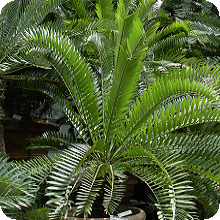|
| Division: Cycadophyta |
| Class: Cycadopsida |
| Order: Cycadales |
| Family: Zamiaceae |
| Genus: Encephalartos |
| Species: E. caffer |
Conservation Status: |

E. caffer
Eastern Cape Dwarf CycadEncephalartos caffer, the Eastern Cape dwarf cycad, is a rare cycad from the genus Encephalartos. Approximately 10,000 mature individuals are confined to the Eastern Cape Province of South Africa .
It typically has an underground stem, with a small portion on top, the stem is only very rarely branched and may be as much as 40 cm long. Emerging from the top are long, pinnate, dark green leaves up to 1 meter long. These often have a distinctive ruffled, feathery appearance, caused by the numerous, clustered leaflets being irregularly twisted from the central stalk and pointing out in different directions. New leaves are brown and woolly at first but most of the hair is lost as they mature, although they never become completely smooth or glossy.
Both male and female plants bear single reproductive cones made up of a series of spiraled scales, which become greenish-yellow when mature. In the female, two largish, glossy, scarlet-coloured seeds are formed on top of each cone scale.
Cultivation:
Hand pollination is necessary for a successful seed harvest in cultivation. Pollen can be collected as soon as the male cones begin shedding (if a light tapping of the male cone produces pollen then the cone is ready to harvest). Store the collected pollen at minus 15°C for best results. The female cone has to be monitored to check when the scales open. The window of the scale opening varies from plant to plant, and may last from three days to two weeks.
After the female cones have been collected, the seed is left to mature for a year before sowing at the beginning of summer. For best results, sow seeds in river sand on a heated bench at 24-28°C. Germination should start three weeks after sowing, but may sometimes take longer. It is relatively slow growing and takes time to recover from relocation and transplanting. Leaves and cones are prone to scale and mealy bug.
| semi-shade | dark green | very low watering | slow growth | frost-resistant | uncommon |
Hand pollination is necessary for a successful seed harvest in cultivation. Pollen can be collected as soon as the male cones begin shedding (if a light tapping of the male cone produces pollen then the cone is ready to harvest). Store the collected pollen at minus 15°C for best results. The female cone has to be monitored to check when the scales open. The window of the scale opening varies from plant to plant, and may last from three days to two weeks.
After the female cones have been collected, the seed is left to mature for a year before sowing at the beginning of summer. For best results, sow seeds in river sand on a heated bench at 24-28°C. Germination should start three weeks after sowing, but may sometimes take longer. It is relatively slow growing and takes time to recover from relocation and transplanting. Leaves and cones are prone to scale and mealy bug.
E. caffer for sale at AfricaCycads.com:
